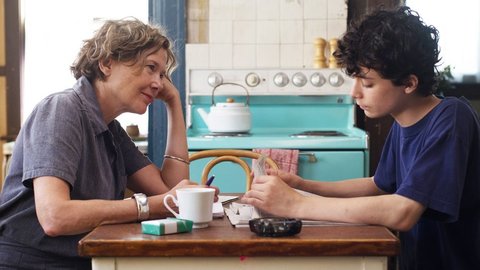B+ | A single mother in 1979 recruits two younger women to help her raise her teenage son. Directed by Mike Mills Starring Annette Bening and Lucas Jade Zumann Initial Review by Jon Kissel |

Leading the ensemble is Annette Bening as Dorothea, one of the great movie moms in recent memory. All set to be a feminist icon as the first female pilot, her fame thwarted by the end of WWII. She settles in to an average life but lives it with the same confidence that she likely would with anything else. She serves as a guardian not just to Jamie, but to the whole community, constantly inviting people over to her home for dinner parties and taking in strays like Abbie and William. Jamie describes her as coming from a generation that didn't admit when anything went wrong. In some aspects, like her untended romantic life and unacknowledged loneliness, that's true, but in others, like her framing of her parenting capabilities, that's not who she is at all. She can admit her flaws and legitimately attempt to understand her son's strange interests. Each of the three titular characters are truth tellers but Dorothea has the most gentle and appealing way of doing so. Mills writes her and Bening plays her as a person who justifiably draws people into her orbit, and it's a place the viewer wants to be as well.
Two of the people she draws in are Abbie and Julie, the former as a tenant and the latter as a painfully-platonic friend for Jamie. The films doesn't just treat them as spinning planets around Dorothea and Jamie, but as independent bodies of their own. Both have their simmering tragedies with Abbie's ailments and Julie's alienation. Both are unmoored from their Santa Barbara lives, with each wanting to be elsewhere. Jamie learns valuable lessons from each about female desire and how to be simply be present for a friend. He doesn't learn valuable lessons from Billy Crudup's William, who's used as a kind of counter-point. His is the life of the body. He serves a useful purpose around the house and he's able to sleep with a lot of women, but it doesn't sustain him and his relationships are doomed by the eventual realization that his partner is smarter than he is, as represented by the way Dorothea is always laughing at his crunchy advice. The women in Jamie's life represent the life of the mind, a path that doesn't promise happiness but feels more earned.
Beginners remains a largely forgettable film in the several years since I've seen it, but when the same amount of time goes by since watching 20th Century Women, it will still occupy a piece of my cinematic memory. This film is a coherent whole, but so many individual parts resonate as palpable, indelible moments. The instigating incident of Jamie's fainting that prompts Dorothea to recruit Abbie and Julie to serve as co-parents is captured breathlessly and truthfully, ranging from Julie's panicked running for help to Dorothea's earnest concern and Jamie's quickness to shrug the whole thing off. Each of the aforementioned backstories are able to hit upon a pang of melancholy, and the epilogue raised my estimation of the film considerably. Recurring motifs like the shots of Jamie alone on his skateboard, zig-zagging down an empty street, are mesmerizing images of teen aimlessness, though other choices, like the several still photo montages, don't work as well. 20th Century Women has been on my mind continuously since I watched it a week ago, something that would have stayed true if a review was immediately forthcoming or if it went in the review backlog.
When Dorothea is trying to understand punk rock and the universal agreement that the music itself is not what anyone would call proficient or 'good,' Abbie responds with the convincing argument that the genre is less about talent than it is about passion. These punk bands may not have the talent to communicate their passion, but the passion is what matters. Mills doesn't have this problem with 20th Century Women, an excellent work that beautifully captures a transitional time in a boy's life during a transitional time for the country. A-
 RSS Feed
RSS Feed